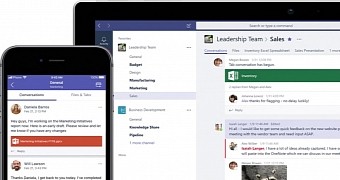Microsoft has confirmed today that it is working on a Linux version for its acclaimed Microsoft Teams universal communications platform.
Supported on some of the most popular desktop and mobile platforms, including Windows, macOS, iOS, and Android, Microsoft Teams offers a unified communications platform where teams can share a workspace where they can chat, share files, and work with business apps.
More and more people are switching to Linux these days, and since Microsoft itself started integrating Linux into its latest Windows 10 operating system with the WSL (Windows Subsystem for Linux) project, as well as to develop new features for the Linux kernel, the company confirmed today it will release Microsoft Teams for Linux.
After it was rumoured that Microsoft might launch a Linux version of its Microsoft Teams communications platform, allowing Linux users to join their Windows, Mac, iOS, and Android teammates, a company employee took to Twitter to confirm that an official version of Microsoft Teams for Linux will soon be available to download.
Ubuntu and Debian are officially supported
Microsoft not only confirmed that it's already working on a Linux version of Microsoft Teams, but it also put up a repository for some of the most popular GNU/Linux distributions, Ubuntu and Debian, which means that the installations will be made through a PPA repo that you users can easily add to their systems.
It looks like Microsoft Teams for Linux was possible due to the high demand from users. A request for a Linux client on the Microsoft Teams UserVoice feedback forum gathered more than 9,000 votes. However, don't expect Microsoft Teams for Linux to be Open Source software, as the code will remain proprietary.
You can try out Microsoft Teams for free right now by visiting the official website, where you can learn everything there is to know about Microsoft's unified communication platform for chat, video calling, file sharing, and more. We'll let you know when the Linux client is available for download, so stay tuned.
https://t.co/PB812lgmoFLet's just say the uservoice page was updated a few days ago. :) — Christopher Scott [MSFT] (@chscott_msft) September 9, 2019

 14 DAY TRIAL //
14 DAY TRIAL //